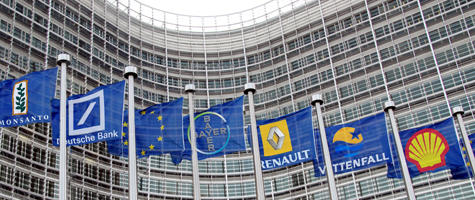Democrat May-June 2013 (Number 135)
Margaret Thatcher and the
Supra-State of a Europe of the Monoplies
Michael Chant
Margaret Thatcher pretended that she was for Britain. She fought those who were eager to merge completely with the European Union. Her defence of Britain did not amount to upholding the sovereignty of the British people or the peoples of Europe or the world. On the contrary, her defence of Britain reflected the striving of British monopoly capitalism to dominate the world.

Thatcher's tenure in office was followed in 1990 by that of Conservative John Major and then in 1997 by Labour Party leader Tony Blair. Blair took up the same social chauvinist and imperialist path where Thatcher and Major left off but raised it to a new level of neo-liberal wrecking. Blair called his particular notion of a Greater Europe, the "people's Europe", which one of his ideologues described as "an association of free member states sharing common interests, not surrendering sovereignty". What these "common interests" may be remains a mystery of state to be manipulated at the whim of the most powerful monopolies that seek to dominate Europe as a springboard to rule the world. The same monopoly interests, represented in the Troika (European Commission - executive of the EU, European Central Bank and International Monetary Fund) are today using the economic crisis to rape and plunder the oppressed peoples of the European Union.
How the peoples of Europe have been treated by the dominant cartels of finance capitalism shows what the Blair/Thatcherite vision of a united Europe as a "people's Europe" means, which in essence is a Europe of the monopolies. It represents an attempt to create a supra European state of the monopolies where the most powerful enslave the weak. Its aim is to create a powerful bloc capable of dominating the world, especially Asia and Africa.
The various notions of a "common European home", "people's Europe" and "free and equal union of European states" only have meaning either as the subjugation of the weaker by the stronger in Europe or in relation to the conquest of other regions, principally Asia and Africa. Margaret Thatcher wanted to make sure that Britain would dominate Europe so that the re-conquest by imperialist Europe of Asia and Africa would be its means to conquer the rest of the world. This is what Tony Blair later expressed as his mission "to make Britain Great again". Margaret Thatcher presided over the period during the late 1980s that ushered in the retreat of the revolution. Her project was to have Britain dominate a Europe of powerful monopolies, with the working class thoroughly enslaved as its reserve, ready to pounce on the world and take it over in a blitzkrieg.
The people have subsequently witnessed this as Britain in league with US imperialism in collusion and contention with other big European powers have launched successive and mounting covert and overt attacks throughout the world, from the former Yugoslavia, to Iraq, Afghanistan, Libya, and now Syria. The Hitlerite method of victory through blitzkrieg has yet to materialise on the Korean Peninsula although that may be the plan. The ongoing assaults are leaving terrible destruction and human suffering in their wake with the crimes against humanity prettified as a fight for democracy and human rights.
There is an alternative for the working class and people. It is to fight against the anti-social offensive, including the dictate coming from the concentration of power in the Europe of the monopolies. It is to fight for a society in which sovereignty is vested in the people, that is to say, where the people are the decision-makers and not those who uphold and implement the interests of the monopolies. That is the lesson coming from the experience of Margaret Thatcher's ideology of the anti-social offensive.